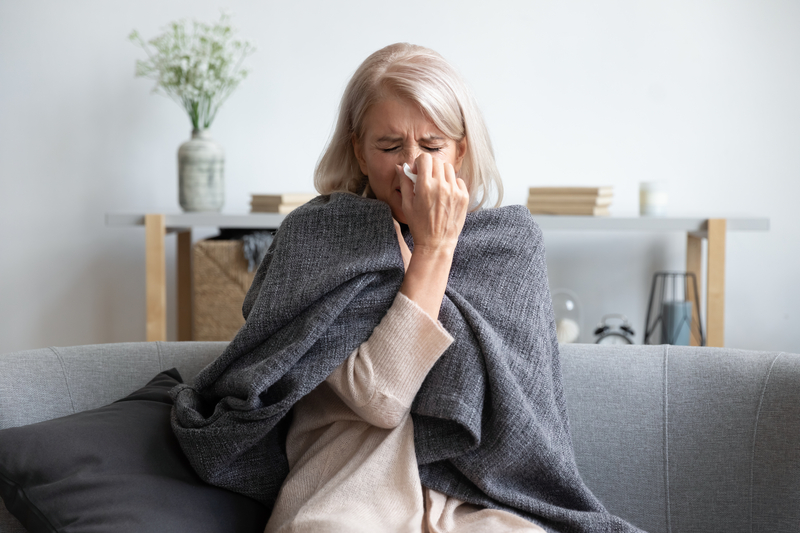These 7 Daily Habits Are Weakening Your Immune System

There’s a lot of talk these days about the immune system: How it works, and of course, the best foods, supplements, and strategies to boost it. Yet it’s also important to avoid habits that can lead to a weakened immune system. Indeed, for a strong immune system, what you don’t do can be just as important as what you do.
Why a Strong Immune System is Vital
It’s simple: The immune system protects the body. It fights disease-causing germs like viruses, bacteria, parasites, and fungi and gets them out of the body. When healthy, it is able to recognize and neutralize damaging compounds from the environment around us. And it’s able to battle against disease-causing changes within the body (e.g., cancer cells). 1
As long as it’s running smoothly, you likely don’t even notice your immune system. We don’t get ill unless faced with a weakened immune system and/or a particularly virulent or unfamiliar pathogen.
When faced with an “antigen” (which can include proteins from bacteria, fungi, viruses, and even undigested food — the result of a leaky gut, for instance) that the body doesn’t recognize as its own, the immune system is activated. Special receptors on the immune cells attach to the antigens, and a series of processes sets off to begin the battle.
The immune system is made up of:
- The skin, which provides a physical barrier to keep germs away
- Mucous membranes in your nose and throat, which secrete mucus, the sticky stuff that lines your nasal passage and lungs to prevent germs from flowing into the bloodstream
- Tonsils and adenoids
- Thymus
- Spleen
- Appendix
- Peyer’s patches
- Bone marrow
- The lymphatic system, including the lymph nodes and lympathic vessels, which carries nutrients into cells and shuttles away waste
Believe it or not, you can find about 80% of your immune system in your gut as gut-associated lymphoid tissue, or GALT for short.
Two subsystems of the immune system work together whenever faced with a harmful intruder. The innate immune system provides general defense to fight off germs that enter through the skin or digestive system using a variety of types of white blood cells (called leukocytes), such as naturally killer (NK) cells, phagocytes, macrophages, mast cells and neutrophils, for example.
The adaptive immune system, on the other hand, fights specific germs, which the body has previously faced. It also makes antibodies, so if it has come into contact with the particular germ before, it will have already learned how to best fight it. Unlike the innate immune system, the adaptive immune system relies on fewer types of cells to carry out its tasks: the lymphocytes, B cells and T cells.
Every day, we come into contact with germs (that could make us ill) in our environment and from the people and pets around us. And without a healthy immune system, we’re more likely to fall ill. Fortunately, a strong immune system is a good learner and is always adapting as its opponents (e.g., bacteria and viruses) are also always changing. 1
Sometimes, however, the immune system can attack its own cells, which is why some people experience autoimmune disease (like rheumatoid arthritis).
What Does a Weakened Immune System Look Like?
Do you seem to be the first person to get sick whenever something’s “going around”? Do you often feel fatigued? Do you have nagging symptoms that seem unexplainable? If so, you may have a weakened immune system. Here are a few of the most common tell-tale signs:
1. Constant Colds and Infections. Most adults suffer from between two and three colds each year. And they typically bounce back and recover from the illness in about 7 to 10 days.2 The immune system takes around three or four days to develop the needed antibodies to fight off those alien invaders. So, if you’re constantly fighting colds throughout the cold and flu season (and at other unexpected times) or you feel like you’ve had the same cold forever, it’s a clear sign that you could have a weakened immune system.
Other signs that indicate your immune system may be struggling include: having frequent ear infections (more than four per year), developing pneumonia more than twice, developing severe infections from common bacterial infections, having chronic sinusitis or suffering from more than three sinus infections per year, and needing to take more than two courses of antibiotics in a year.3
2. Tummy Troubles. Do you experience frequent gas, diarrhea, or constipation? If so, that’s another common sign of a weakened immune system. The gut microbiota that lives within the gastrointestinal tract is vital for regulating immune homeostasis. In other words, it both strengthens a healthy immune response and prevents immune dysfunction that can lead to autoimmune issues.4 Remember, up to 80% of the immune system is found in the digestive tract, so tummy troubles can be one of the first indicators that the immune system needs help.
3. Impaired Healing. Whenever the skin is wounded (say from a cut, scrape, or burn), the body responds by sending nutrient-rich blood to help the skin heal and regenerate. Of course, healthy immune cells are also involved in the regeneration. So, if you get injured and find your skin is slow to heal, then you may be suffering from a weakened immune system.
4. Chronic Fatigue. Do you feel like you’re getting enough sleep (between 7 and 9 hours per night) but still feel sluggish throughout the day? Your immune system may be sending up red flags as it is trying to conserve enough energy to fight off the germs it comes in contact with.5
10 Causes of a Weakened Immune System
If you were born with a weakened immune system (aka primary immune deficiency), you likely are well aware of it. Another cause of a weakened immune system is acquired immune deficiency, which is caused by disease. More commonly, many of us unknowingly have a weakened immune system due to our habits, lifestyle, and activities, such as:
1. Serious Stress. Stress is a sign of the times and actually a healthy part of life. But if stress is chronic and high or if you’re feeling lonely or depressed, it can do some serious damage to the immune system.6
Stress, for example, increases production of the stress hormone cortisol. This hormone, in turn, can impair the function of T-cells, which are needed to fight off infections.
Help ease stress by getting support from friends far and near, setting appropriate boundaries, enjoying regular, moderate-intensity exercise, and practicing relaxation techniques like meditation, yoga, earthing, and forest bathing.
2. Feeling Lonely. Loneliness can lead to anxiety, oxidative stress, and damage from free radicals as well as a decrease in immunity. If you are staying safe at home alone, it’s hard to enjoy the stress-buffering effect of touch, and you may be missing a good hug. And if you have a loved one who is especially vulnerable, you may miss hugging them. (On a personal note, I really miss hugging my 81-year-old mom who’s still recovering from a winter bout of pneumonia.)
If you’re missing hugs from family and friends as much as I am, the Icelandic Forestry Service offers a fun solution. Go hug a tree. Yes, really.7 Humans are emotional beings, and connecting with others, especially during times of fear and stress, is vital to our health. We can enjoy connecting verbally from afar, but touch is also healing. While tree hugging itself hasn’t been studied (unless you’re looking at koalas), spending time in nature as well as urban forestry have. And spending time with trees has been shown to have numerous positive effects, including:8
- Improved immune functioning
- Reduced blood pressure
- Reduced stress
- Improved mood
- Increased ability to focus
- Accelerated recovery from illness or surgery
- Increased energy
- Improved sleep
Even when you’re feeling lonely, being around trees has been shown to be good for mental as well as social well-being. What’s more, being in nature may also lead to increased creativity, kindness, and trust.9
3. Body Fat Accumulation. Being overweight or obese (or more accurately, over fat) puts a lot of stress on the body. The increased body fat can cause low-grade, chronic inflammation. When the body is constantly fighting inflammation, the immune system can be stretched thin, making it harder to fight off infection.10
If you’re are looking for real solutions to lose excess body fat, you’re in the right place. Every week, we share nutrition, fitness, and lifestyle strategies to help you reach your health goals. We also have an abundance of mouth-watering, healthy recipes that are easy to make. And perhaps most importantly, we have one of the most supportive communities you can find anywhere.
4. Not Exercising at All. If we’re honest, the vast majority of us sit around way too much, especially those of us with desk jobs. It doesn’t matter how old you are, what gender you are, or even if you have other harmful habits, research has found that a sedentary lifestyle increases the risk of impaired immune functioning, unhealthy levels of inflammation, chronic disease, and premature death.11
A mere 30 to 45 minutes of moderate exercise five days per week has been shown to help support a strong immune system.12 And it can be as simple as a walk, swimming, yoga, at-home resistance training, or biking (or a combination of your favorite fitness activities).
5. Exercising Too Much. While moderate exercise is great for your immune system, too much exercise takes a toll. If you exercise too much and too hard (e.g., overtrain), you can make your body more vulnerable to illness.13 If you are an athlete who enjoys seeing how far you can push yourself, make sure you are getting plenty of rest, eating a highly nutritious diet, and giving your body time to recover. Understand that exercise takes a goldilocks approach of not too little and not too much to avoid a weakened immune system.
6. Nicotine Exposure. If you’ve given up smoking only to turn to e-cigarettes or patches, it’s time to consider finding ways to break the nicotine habit once and for all. Nicotine, no matter how you get it, may suppress the immune system. For example, it increases the stress hormone cortisol, reduces antibody formation, suppresses the response of T cells to antigens, and can damage the lungs and release free radicals into the airways.14,15,16 All of which makes the body more susceptible to infection. This sets up a perfect environment for bacteria and viruses to do their damage.
7. Drinking Too Much Alcohol
When it comes to causes of a weakened immune system, alcohol deserves special attention. You see, during hard times, such as stagnant job markets, recessions, or other widespread disasters, alcohol sales thrive. It comes as no surprise that during times of stress, many people turn to alcohol to “take the edge off.”
For but one example, alcohol sales rose by 55% in late March 2020 amid the coronavirus pandemic, especially hard liquors like tequila and gin.17 Spirit sales were up 75%, beer sales were up by 66%, and wine sales were up 42% over the same time the previous year due to increased stress, depression, and boredom.17
While one drink may not cause much harm, if that drink turns into three or four, then serious problems can arise. Unfortunately, even one bout of excessive alcohol consumption can lead to a suppressed immune system.18 For example, it can impair ciliary function in the lungs, so they’re more prone to invasion, and it also impairs the body’s ability to attack bacteria and viruses.19 And people who regularly abuse alcohol are particularly prone to lung infections like pneumonia and tuberculosis.19
Daily Habits of a Weakened Immune System: A Wrap-Up
During stressful times, it’s common for people to let their healthy habits fall by the wayside. That is completely understandable. Yet to help our bodies better fend off any invaders, now is a good time to look at daily habits to see if any need to be addressed and improved. Some common daily habits that could result in a weakened immune system include:
- Sitting too much/being sedentary
- Working out too much/overtraining
- Feeling stressed or burnt out
- Drinking too much (more than 14 drinks per week for men and 7 drinks per week for woman)
- Feeling lonely
- Not getting enough sleep
- Smoking, vaping, or using nicotine in any form
- Eating too much sugar and high-processed foods
- Not eating enough vegetables, fruits, and protein
- Getting too much or not enough sunlight
Fortunately, there are a lot of habits you can develop to improve your immune system as well. Here are some of our best resources:
- Top 10 Supplements + Strategies for Supporting the Immune System
- How to Boost Your Immune System Naturally
- 7 Ways to Boost Your Immune System Today
- Eat These Immune System Boosting Foods Now
- 4 Immune-Boosting Smoothie Recipes to Help Keep You Healthy





 7 Signs Your Body is Seriously Low on Collagen (not just wrinkles)
7 Signs Your Body is Seriously Low on Collagen (not just wrinkles) Health Expert: "Turmeric Doesn't Work (unless...)"
Health Expert: "Turmeric Doesn't Work (unless...)" 3 Warning Signs Your Probiotic Supplement is a Total Waste
3 Warning Signs Your Probiotic Supplement is a Total Waste

